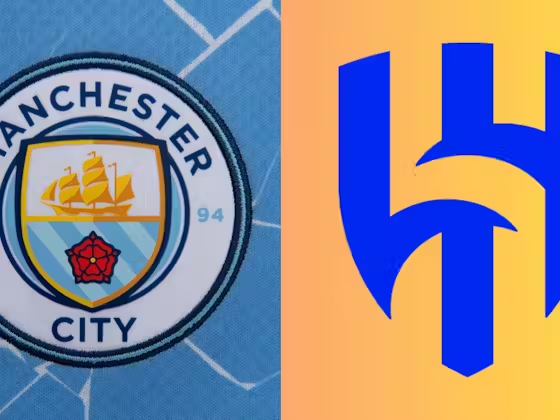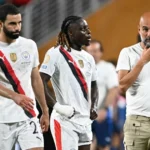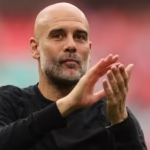Al Hilal keen to show their level vs. Man City at Club World Cup

In the sprawling metropolis of Orlando, Florida, under the glaring lights of the American summer, a football revolution is quietly unfolding. Al Hilal, the Saudi Arabian football powerhouse often dubbed the “Real Madrid of the Middle East,” has arrived at the FIFA Club World Cup with ambitions that transcend mere participation. After securing their passage to the round of 16 with a hard-fought goalless draw against FC Salzburg, the Riyadh-based club stands on the precipice of what could be their most defining moment in international football.
The significance of this tournament for Al Hilal cannot be overstated. While their European counterparts might be motivated primarily by the substantial prize money on offer, Al Hilal’s motivations run deeper, more philosophical, and infinitely more ambitious. Backed by Saudi Arabia’s Public Investment Fund, with its staggering estimated worth of nearly $100 billion, the Blue Waves are not here for financial gain. They are here to stake their claim at football’s most exclusive table, to prove that the desert can bloom with footballing excellence, and to demonstrate that the global game’s future might well have its roots in the sands of Saudi Arabia.
The Inzaghi Era: A Statement of Intent
The appointment of Simone Inzaghi as Al Hilal’s head coach represents perhaps the most audacious statement of intent in the club’s illustrious history. Just four days after watching his Inter Milan side fall to Paris Saint-Germain in the Champions League final, the Italian tactician was unveiled as the new architect of Al Hilal’s footballing philosophy. The speed of the transition speaks volumes about the club’s ambition and their unwavering commitment to excellence.
Inzaghi himself has been clear about the mission: “Our goal was to achieve (being in) the group of the best teams in the world.” These words, spoken in the aftermath of their qualification for the knockout stages, encapsulate the mindset that has transformed Al Hilal from a regional powerhouse into a global footballing force.
The acquisition of Inzaghi represents more than just a coaching appointment; it is a coup that reverberates throughout world football. His credentials are impeccable: two Champions League finals and a Serie A title during his four-year tenure at Inter Milan, combined with his tactical acumen and infectious passion for the game. European giants Manchester United and Barcelona had been monitoring his situation, yet it was Al Hilal who moved decisively to secure his services.
Reports suggest that Inzaghi’s deal makes him “the world’s highest-paid manager,” a designation that reflects not only Al Hilal’s financial muscle but also their determination to compete at the highest level. The investment in Inzaghi is symbolic of a broader philosophy: that to compete with the world’s best, you must first attract the world’s best.
The Galáctico Strategy: Building a Global Brand
Al Hilal’s transformation into a global footballing brand did not happen overnight. Founded in 1957, the club has deep roots in Saudi Arabian football culture, but their recent metamorphosis has been nothing short of spectacular. The catalyst for this change was the broader investment in Saudi football, epitomized by Cristiano Ronaldo’s groundbreaking move to Al Nassr in January 2023.
Not to be outdone, Al Hilal responded with their own galáctico signing, securing the services of Neymar from Paris Saint-Germain for a staggering €90 million eight months later. While injuries limited the Brazilian superstar to just seven appearances before his recent return to Santos, his presence alone elevated Al Hilal’s global profile exponentially.
The impact of these high-profile signings extends far beyond the pitch. Where once football fans outside Saudi Arabia would have struggled to name a single domestic team, Al Hilal shirts are now a common sight in European cities. Their social media following has exploded to over 40 million followers, placing them in the same bracket as established Premier League clubs.
This digital footprint represents more than mere numbers; it signifies a fundamental shift in how football’s global audience perceives Middle Eastern football. Al Hilal has successfully transcended geographical boundaries to become a truly international brand, with supporters from São Paulo to Seoul, from London to Lagos.
The Star-Studded Squadron
The current Al Hilal squad reads like a who’s who of international football talent. Kalidou Koulibaly, the Senegalese defensive stalwart who graced the fields of Napoli and Chelsea, brings Premier League and Serie A experience to the heart of their defense. Renan Lodi, the Brazilian left-back who starred for Atlético Madrid, provides attacking thrust from the flanks. Sergej Milinković-Savić, the Serbian midfielder who terrorized Serie A defenses for years with Lazio, adds creativity and goal-scoring threat from midfield.
The attacking options are equally impressive. Aleksandar Mitrović, the Serbian striker who has scored goals at every level of European football, spearheads their forward line. Rúben Neves, the Portuguese midfielder who captivated Wolverhampton Wanderers fans with his range of passing and dead-ball expertise, provides the midfield anchor. João Cancelo, the versatile full-back who has played for Europe’s elite clubs including Manchester City and Barcelona, adds tactical flexibility and experience.
This constellation of talent represents more than just a collection of skilled individuals; it embodies Al Hilal’s philosophy of attracting players who have competed at the highest level and understand what it takes to succeed on the biggest stages. Each player brings not only their technical abilities but also their experience of pressure-cooker environments and winner’s mentality.
The Road to Respect: Group Stage Heroics
Al Hilal’s journey to the round of 16 has been marked by performances that have earned them respect across the footballing world. Their 1-1 draw with Real Madrid in the group stage stands as a testament to their quality and tactical sophistication. To hold the Spanish giants, winners of multiple Champions League titles, to a draw is no small feat and serves as validation of their approach.
The tactical discipline displayed in that match, combined with their resilience in the goalless draw against FC Salzburg, demonstrates that Al Hilal are not merely tourists in this tournament. They possess the tactical awareness, technical ability, and mental fortitude required to compete at this level. Each match has served as a building block, preparing them for the ultimate test that awaits.
Inzaghi’s tactical imprint is already visible in their play. The Italian’s preferred 3-5-2 formation has been adapted to maximize the strengths of his diverse squad, with the wing-backs providing width while the midfield trio controls the tempo. The defensive solidity that characterized his Inter Milan side is evident, but there’s also a fluidity in attack that suggests his players are buying into his philosophy.
The Manchester City Challenge: A Test of Character
Monday’s round of 16 clash against Manchester City represents the ultimate litmus test for Al Hilal’s ambitions. Manchester City are back to their usual self – not just with Rodri’s return, but in the style of football Pep Guardiola’s squad has become synonymous with over recent years. For Al Hilal, this match represents an opportunity to prove that their investment in infrastructure, talent, and coaching has been worthwhile.
The tactical battle between Inzaghi and Pep Guardiola adds another layer of intrigue to the encounter. Inzaghi has expressed his respect for the challenge ahead: “I have great respect; it will be a pleasure to play against City and face Pep again.” The history between these two coaches adds personal stakes to the professional challenge, with Inzaghi’s Inter having faced Guardiola’s City in previous European encounters.
The match represents a collision of footballing philosophies. Guardiola’s possession-based approach, built on intricate passing patterns and positional play, will face Inzaghi’s more pragmatic style, which emphasizes defensive solidity and quick transitions. The tactical chess match between these two masters of the game promises to be as fascinating as the individual battles across the pitch.
For Al Hilal’s players, this represents a chance to showcase their abilities against one of Europe’s premier sides. The experience of competing against Kevin De Bruyne, Erling Haaland, and the rest of City’s star-studded lineup will be invaluable, regardless of the result. These are the moments that define careers and elevate players to new levels of understanding about the game.
The Broader Saudi Vision: Football as Soft Power
Al Hilal’s Club World Cup campaign must be understood within the broader context of Saudi Arabia’s Vision 2030, the kingdom’s ambitious plan to diversify its economy and enhance its global standing. Football has emerged as a crucial component of this vision, with the sport serving as a powerful tool for soft diplomacy and cultural exchange.
The investment in Al Hilal and other Saudi clubs is not merely about sporting success; it’s about positioning Saudi Arabia as a serious player in the global sports entertainment industry. The kingdom’s bid to host the 2034 FIFA World Cup, combined with its investments in golf, Formula 1, and boxing, represents a comprehensive strategy to establish itself as a sporting superpower.
Chief Executive Esteve Calzada’s comments to ESPN underscore this ambition: “It shows our ambition. It puts us in a very good position to compete.” This positioning is crucial for a nation seeking to reshape its international image and attract foreign investment and tourism.
The success of Al Hilal at the Club World Cup would provide powerful validation of this strategy. A strong showing against Europe’s elite would demonstrate that Saudi football has evolved beyond its regional roots to become a legitimate force in the global game. It would also serve as a powerful marketing tool, showcasing the kingdom’s ability to attract world-class talent and compete at the highest level.
Cultural Impact and Fan Engagement
The transformation of Al Hilal has had profound cultural implications within Saudi Arabia and across the broader Middle East. The sight of international superstars donning the famous blue shirt has inspired a new generation of young Saudis to dream bigger and believe that their local clubs can compete with anyone in the world.
The club’s social media presence has become a masterclass in digital engagement, with content that resonates with global audiences while maintaining strong local connections. Their multimedia approach includes behind-the-scenes content, player interviews in multiple languages, and tactical analysis that appeals to football purists worldwide.
This digital revolution has also changed how Saudi football is consumed domestically. Match attendance has increased dramatically, with fans drawn not only by the star power but also by the improved quality of play and the sense that they are witnessing history in the making. The atmosphere at Al Hilal’s home matches has become electric, with supporters understanding that they are part of something special.
The ripple effects extend beyond football. Local businesses have benefited from increased interest in Saudi football, with merchandise sales, hospitality, and tourism all seeing significant growth. The presence of international media covering Al Hilal’s matches has provided unprecedented exposure for the kingdom’s culture and hospitality.
Tactical Evolution Under Inzaghi
Simone Inzaghi’s arrival has brought a new level of tactical sophistication to Al Hilal’s play. The Italian’s ability to adapt his system to different opponents and situations has been evident throughout the group stage, with the team showing remarkable flexibility in their approach.
The defensive structure has been particularly impressive, with the three-man backline providing both stability and the ability to transition quickly to attack. Koulibaly’s experience and leadership have been crucial in organizing this defensive unit, while the wing-backs have provided the width necessary to stretch opposing defenses.
In midfield, the combination of Milinković-Savić’s creativity and Neves’s passing range has given Al Hilal multiple ways to build attacks. The Serbian’s ability to arrive late in the box and score crucial goals has been particularly valuable, while the Portuguese midfielder’s set-piece delivery has created numerous opportunities.
The attacking phase has seen Mitrović adapt his game to suit Inzaghi’s requirements, with the Serbian striker showing improved movement and link-up play. His physical presence has been complemented by the pace and trickery of the wide players, creating a multi-dimensional attack that has troubled even the most organized defenses.
The Economic Dimension: Investment and Returns
The financial investment in Al Hilal represents a calculated gamble on the future of global football. The club’s ownership through the Public Investment Fund provides them with resources that few clubs worldwide can match, but this investment comes with expectations of returns that extend beyond mere sporting success.
The commercial potential of Al Hilal’s global brand is enormous. Merchandise sales, sponsorship deals, and broadcasting rights represent significant revenue streams that are only beginning to be fully exploited. The club’s participation in the Club World Cup has already generated substantial media coverage and commercial interest from global brands seeking to associate themselves with their success story.
The development of football infrastructure in Saudi Arabia has also created opportunities for local businesses and international partners. The construction of new training facilities, the improvement of existing stadiums, and the development of youth academies have all contributed to job creation and economic growth.
The long-term vision extends to the development of Saudi football at all levels. The presence of world-class coaches and players in the Saudi Pro League has already begun to raise the standard of local talent, with young Saudi players benefiting from training alongside international stars and learning from experienced coaches.
Youth Development and Legacy
One of the most significant aspects of Al Hilal’s transformation has been the emphasis on youth development and legacy building. The club’s academy has been restructured to incorporate international best practices, with young Saudi players now having access to world-class facilities and coaching.
The presence of international stars has provided invaluable learning opportunities for young players. Training alongside players who have competed in the Premier League, La Liga, and the Champions League has exposed them to different approaches to the game and higher standards of professionalism.
The cultural exchange has been equally important. Young Saudi players are learning not just about football tactics and techniques but also about the mindset and dedication required to succeed at the highest level. This knowledge transfer represents a crucial investment in the future of Saudi football.
The success of Al Hilal at the Club World Cup would provide powerful inspiration for the next generation of Saudi footballers. It would demonstrate that with the right investment, coaching, and commitment, Saudi clubs can compete with anyone in the world. This belief could transform the ambitions of young players and coaches throughout the kingdom.
Conclusion: The Dawn of a New Era
As Al Hilal prepares for their crucial encounter with Manchester City, they carry with them the hopes and dreams of not just their supporters but of an entire nation seeking to establish itself as a major force in world football. The match represents more than just a round of 16 clash; it is a statement of intent, a declaration that the traditional hierarchies of world football are being challenged and reshaped.
The journey of Al Hilal from regional powerhouse to global brand has been remarkable, but it is far from complete. The Club World Cup represents a crucial milestone in their evolution, an opportunity to prove that their investment in talent, infrastructure, and coaching has been worthwhile.
Regardless of the outcome against Manchester City, Al Hilal have already achieved something significant. They have changed perceptions about Middle Eastern football, attracted world-class talent to the Saudi Pro League, and inspired a new generation of players and fans. They have shown that with vision, investment, and commitment, any club can aspire to compete at the highest level.
The match against Manchester City will be watched by millions around the world, many of whom will be seeing Al Hilal play for the first time. It represents a chance for the club to showcase their progress and demonstrate that they belong among the elite of world football. Win or lose, Al Hilal have already won something more valuable: respect, recognition, and a place in the global conversation about the future of football.
The desert has bloomed, and the world has taken notice. Al Hilal’s journey at the Club World Cup is just the beginning of what promises to be a fascinating new chapter in the history of world football. The blue waves are rising, and they are ready to make their mark on the global stage.















